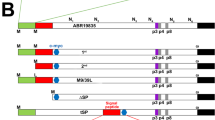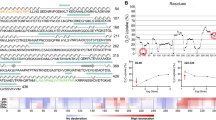Abstract
Sequential expression of variant surface glycoproteins (VSGs) enables the parasitic protozoan Trypanosoma brucei to evade the immune response of its mammalian hosts1,2. Studies of several VSGs, which have been isolated as soluble molecules following disruption of cells in the absence of detergent, have indicated extensive amino acid diversity3–5 and the absence of a hydrophobic segment which might serve to anchor the carboxy terminus to the membrane5. The carboxy-terminal tryptic peptides of six VSGs have recently been characterized and shown to be glycosylated6. Three of these VSGs terminated with a glycosylated aspartate or asparagine residue (Asx), suggesting that the VSG was cleaved following synthesis and glycosylation and before characterization. We present here nucleotide sequence data which suggest that the primary translation product of one VSG gene contains a hydrophobic tail at the carboxy terminus which is not found on the isolated, mature glycoprotein6. The data also predict that the glycosylated residue is aspartic acid rather than the anticipated asparagine.
This is a preview of subscription content, access via your institution
Access options
Subscribe to this journal
Receive 51 print issues and online access
$199.00 per year
only $3.90 per issue
Buy this article
- Purchase on Springer Link
- Instant access to full article PDF
Prices may be subject to local taxes which are calculated during checkout
Similar content being viewed by others

References
Vickerman, K. Nature 273, 613 (1978).
Cross, G. A. M. Proc. R. Soc. B202, 55 (1978).
Cross, G. A. M. Parasitology 71, 393 (1975).
Bridgen, P. J., Cross, G. A. M. & Bridgen, J. Nature 263, 613 (1976).
Johnson, J. G. & Cross, G. A. M. Biochem. J. 178, 689 (1979).
Holder, A. A. & Cross, G. A. M. Molec. biochem. Parasit, (in the press).
Hoeijmakers, J. H. J., Borst, P., Van den Burg, J., Weissmann, C. & Cross, G. A. M. Gene 8, 391 (1980).
Proudfoot, N. J. & Brownlee, G. G. Nature 263, 211 (1976).
Porter, A. G. et al. Nature 282, 471 (1979).
Waxman, D. J. & Strominger, J. L. J. biol. Chem. 254, 4863 (1979).
Davis, B. D. & Tai, P.-C. Nature 283, 433 (1980).
Barbet, A. F. & McGuire, T. C. Proc. natn. Acad. Sci. U.S.A. 75, 1989 (1980).
Marshall, R. D. Biochem. Soc. Symp. 40, 17 (1974).
Maxam, A. M. & Gilbert, W. Proc. natn. Acad. Sci. U.S.A. 74, 560 (1977).
Sanger, F. & Coulson, A. R. FEES Lett. 87, 107 (1978).
Author information
Authors and Affiliations
Rights and permissions
About this article
Cite this article
Boothroyd, J., Cross, G., Hoeijmakers, J. et al. A variant surface glycoprotein of Trypanosoma brucei synthesized with a C-terminal hydrophobic ‘tail’ absent from purified glycoprotein. Nature 288, 624–626 (1980). https://doi.org/10.1038/288624a0
Received:
Accepted:
Issue Date:
DOI: https://doi.org/10.1038/288624a0
This article is cited by
-
Emerging functional roles for the glycosyl-phosphatidylinositol membrane protein anchor
The Journal of Membrane Biology (1990)
-
The membrane form of variant surface glycoproteins of Trypanosoma brucei
Nature (1983)
-
Point mutations during generation of expression-linked extra copy of trypanosome surface glycoprotein gene
Nature (1982)
-
Antigenic variation in the trypanosome
Nature (1982)
Comments
By submitting a comment you agree to abide by our Terms and Community Guidelines. If you find something abusive or that does not comply with our terms or guidelines please flag it as inappropriate.


